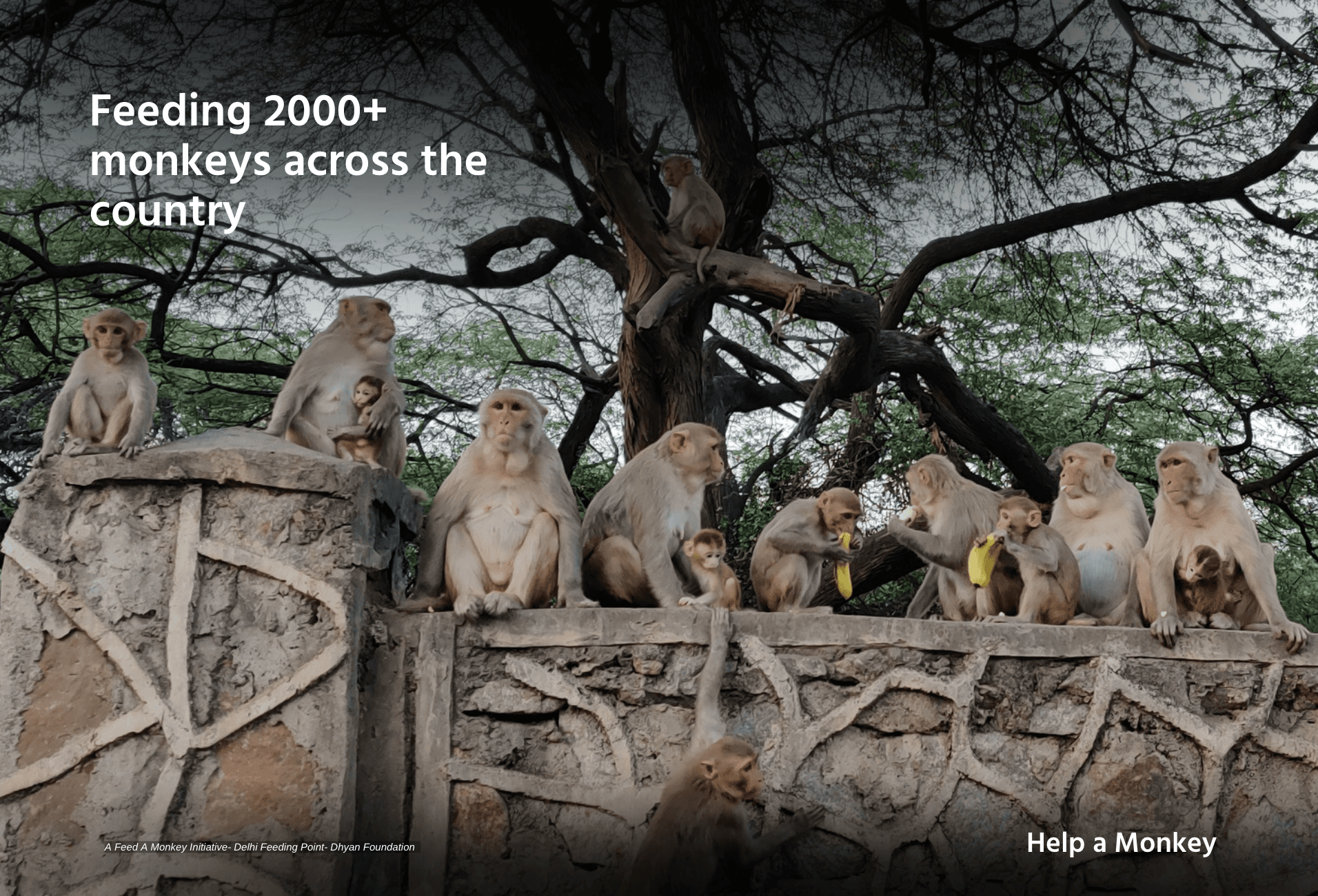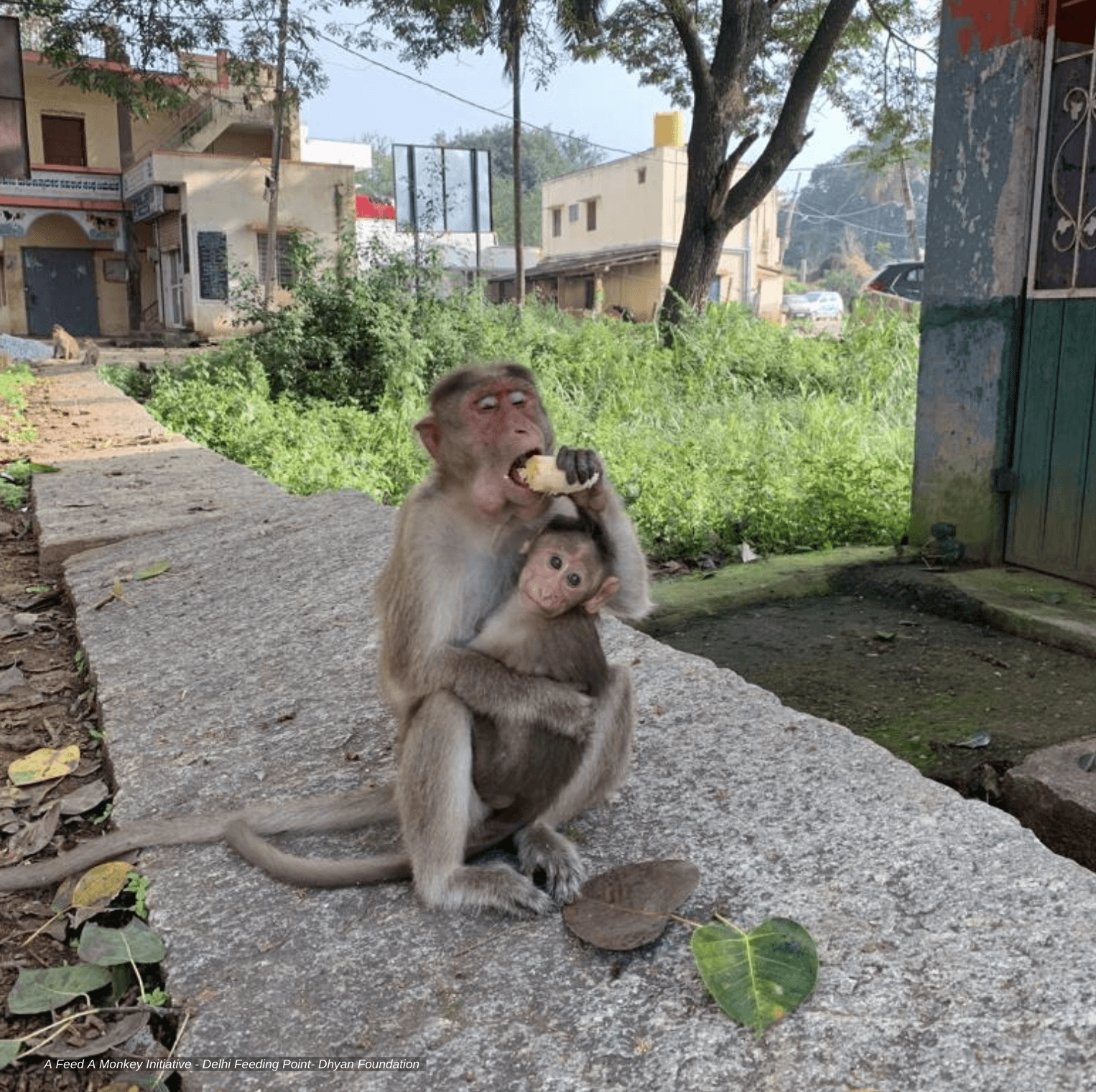Help A Monkey
The Plight
of monkeys in India paints a grim picture as deforestation and urbanization encroach upon their natural habitats—the trees. Branded as nuisances for seeking food and shelter from humans, they face hostility, with authorities even resorting to mass culling and sterilization campaigns. Tragically, they fall victim to traffic accidents, electrocution, starvation, and harsh climates. Is this fair?
Let us not overlook the inherent shakti, or energy, within every animal, bird, and tree—a concept revered by ancient civilizations worldwide. Recognizing the interconnectedness of all beings through the five elements underscores the importance of preserving every form of life.
Through the ages, monkeys, referred to as 'Vanara' in Sanskrit, have held a special place in Indian culture, epitomized by Hanuman, the revered devotee of Lord Ram. Mythology recounts his feats, from carrying the mountain of Sanjeevani Buti to attempting to swallow the sun. Beyond India, monkeys have been revered in Mayan and Buddhist traditions, symbolizing wisdom and divine messengers.
Sadly, this venerated creature now faces exploitation and cruelty, suffering at the hands of humans. Tortured for meat and skin, they endure indirect harm from human activities like deforestation and pollution, leading to habitat destruction.
The karmic repercussions of such cruelty are dire, manifesting in natural disasters and ecological imbalance. Recognizing this, the 'Help a Monkey' initiative was launched to alleviate their suffering. Across cities like Delhi, Vrindavan, Hyderabad, Tirupati, and Mysore, feeding drives have been initiated to provide sustenance to these creatures.
In Vrindavan, where monkeys face hunger and unintentional harm, volunteers provide daily meals, aiming to create awareness and establish feeding points away from urban areas. Similar efforts are underway in Delhi, Hyderabad, Tirupati, and Mysore, ensuring that these beings receive nourishment and care, even amidst urbanization and habitat loss.

The encroachment of urban sprawl into once lush jungle lands, coupled with widespread deforestation, has left the denizens of the forest displaced and homeless. Monkeys, once inhabitants of thriving ecosystems, now roam the streets, residential areas, temple precincts, and public spaces in search of sustenance. However, their mischievous nature and proximity to human settlements often lead to conflicts, with humans resorting to extreme measures such as electrification, stone pelting, and even lethal force to deter them. In certain states, monkeys have been labelled as vermin and targeted for extermination if found near farmlands.
Yet, monkeys, like all creatures, deserve the right to live. Their displacement from their natural habitats does not warrant their vilification as vermin. Recognizing this injustice, Dhyan Foundation initiated a drive to feed monkeys in secluded, uninhabited areas, away from roads and human settlements. This ensures that their hunger is satiated while mitigating the perceived threat they pose to humans.
In cities like Delhi (Asola Sanctuary) and Uttar Pradesh (Vrindavan), regular feeding drives provide sustenance to these displaced primates. Previous efforts included feeding at Jhaku Temple in Shimla until forest authorities took over feeding responsibilities in forested areas. During the lockdown, feeding drives were intensified in temple towns like Ayodhya, Allahabad, and Mathura, as well as in Lopburi (Thailand) and Bhubaneshwar (Odisha).
Additionally, 'Help a Monkey' strives to educate communities about the importance of wildlife conservation and preserving natural habitats. Through outreach programs, the initiative aims to foster compassion and understanding, nurturing a culture of coexistence where humans and animals can thrive in mutual respect and harmony.
Moreover, the project extends its efforts beyond mere sustenance, addressing broader issues such as habitat restoration and community engagement. Collaborating with local authorities and organizations, 'Help a Monkey' endeavours to develop sustainable solutions that benefit both wildlife and human communities.
In essence, 'Help a Monkey' is more than just about feeding hungry creatures—it's about forging a deeper connection between humans and nature, cultivating empathy and compassion, and working towards a future where every being is valued and safeguarded.
What you can do




